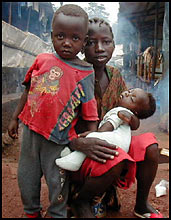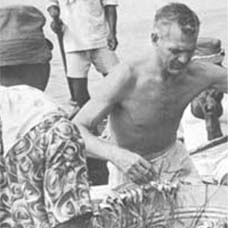
"People risked their lives to vote in 1996," said Joseph Opala, an American anthropologist working in Sierra Leone. "And three years later we force them to accept mass murderers into government."
U.S. Backs Amnesty in Sierra Leone
Caption: Sierra Leone war victim Finnah Dabo, whose left hand was amputated by the rebels, lives with her two children and husband in a Freetown camp for victims of civil war atrocities. (Reuters)
By Steven Mufson
Washington Post Staff Writer
Monday, October 18, 1999; Page A13
Consider a country where 2 million people have been driven from their homes ? twice as many as in Kosovo ? and 20,000 are dead after eight years of violence. War criminals abound in this country. They have hacked off limbs in a campaign called "Operation No Living Thing." One victim had his arm amputated, his tongue cut out and his severed hands placed in his pocket.
But instead of convening a war crimes tribunal for the leaders of this brutal campaign, the United States is backing a peace accord that would put eight of them in the cabinet of the democratically elected government. Instead of sending in U.S. warplanes or allied troops, the United States dispatched Jesse L. Jackson to urge the country's president to come to terms with the rebels.
The country is Sierra Leone, the second stop on Secretary of State Madeleine K. Albright's tour of Africa this week. Albright will lend U.S. support to a peace accord forged over the summer that includes an amnesty.
Clinton administration officials argue that a deal with the rebels was the fastest and perhaps only practical way to end the fighting. They point to Mozambique and South Africa as countries that achieved reconciliation with truth commissions still putting "the spotlight" on atrocities. And they also hold out the possibility of future war crimes investigations, noting that the United Nations is not bound by the amnesty agreement included in the peace accord.
"There will never be peace and security and an opportunity for development and recovery in Sierra Leone unless there is a solution to the source of the conflict. And that entails, by necessity ? whether we like it or not ? a peace agreement dealing with the rebels," Susan Rice, the assistant secretary of state for African affairs, said Friday.
Yet human rights groups and many people in Africa perceive a double standard. They say the treatment of Sierra Leone contrasts sharply with the U.S. involvement in Kosovo and shows the limits of the West's concern for Africa.
The Clinton administration "has not pursued justice as vigorously in Sierra Leone as it has in other parts of the world," says Human Rights Watch, which calls the amnesty "a mistake."
"It's appalling that these people are not subject to criminal prosecution but are rewarded with roles in government," said David Wippman, a Cornell University professor of international law and former National Security Council staff member. "It's really a dilemma created by the lack of international will to commit resources and troops needed to restore peace without having to accept the demands of these rebel forces."
Sierra Leone, a country of no strategic importance to the United States, highlights the Clinton administration's struggle to define places worthy of intervention on humanitarian grounds. The administration supports a plan to send in 6,000 U.N. peacekeepers, but no Americans are expected to go.
"I know that some are troubled that the United States and others cannot respond to every humanitarian catastrophe in the world," President Clinton told the U.N. General Assembly in September. "We cannot do everything everywhere."
Last week, Albright again tried to delineate American intervention. "We have to recognize the truth that there are times, not only when we can act, but when we absolutely must act," she said Wednesday at the University of Maine. Yet, she added, "We have to resist the temptation to use our forces in every dispute that catches our eye or our emotions."
Sierra Leone is a dispute that catches the emotions. Just three years ago, it was an example of struggling democracy in Africa. Defying harassment by the rebel Revolutionary United Front (RUF), Sierra Leone's voters turned out in late 1996 to elect Ahmad Tejan Kabbah as their president. He quickly signed a peace agreement with the RUF, but the accord fell apart within two months.
By May 1997, Kabbah had been ousted in a coup led by an army major, Johnny Paul Koroma, who banned political parties, suspended the constitution and invited the RUF to join a new government. The U.N. Security Council responded with an arms and oil embargo, but it took an offensive by Nigerian-led troops from the Economic Community of West African States Cease-fire Monitoring Group (ECOMOG) to reinstate Kabbah in 1998 and reestablish control over about two-thirds of the country.
The RUF held onto power in diamond-rich districts and launched its campaign of terror, burning villages, mutilating civilians, raping women and ambushing convoys. In January, the RUF attacked the capital, Freetown, and scattered the poorly run, poorly funded ECOMOG forces. ECOMOG later regrouped and drove the RUF from Freetown, summarily executing hundreds. But rebels retained control of many areas.
At the urging of Jackson, Kabbah signed a cease-fire with the RUF in May. Finally, on July 7, Kabbah signed a peace agreement with RUF leader Foday Sankoh.
The United States played no direct role in these events but was involved behind the scenes at several critical points.
It supported a 1996 decision to expel Executive Outcomes, a largely white South African mercenary force hired by an earlier military government to safeguard Sierra Leone's diamond regions. The mercenaries, numbering a few hundred, were able to secure the capital and key areas in the countryside.
But they were expensive. The World Bank and International Monetary Fund urged Sierra Leone to cut military spending, which amounted to nearly 30 percent of its budget. By the time Kabbah was elected, the government owed Executive Outcomes $17 million, according to a former Western diplomat.
"I never felt comfortable about a bunch of South Africans running around the country with guns," said one former Western ambassador. "I'm not sure their motives were pure and clean."
But another Western diplomat who encouraged the departure of Executive Outcomes said, "In retrospect, it was a mistake to have them leave. . . . There was a myth of invincibility about them that was very useful."
The 1997 coup took place three months after the mercenaries left.
The United States also limited military assistance to ECOMOG. U.S. diplomats worried that aid to ECOMOG would be diverted to the Nigerian government, then a repressive military regime. And ECOMOG's troops engaged in so much looting that Western diplomats joked that its name stood for "every conceivable movable object gone."
Yet if the Clinton administration wants to rely on regional armies to settle conflicts, critics say, it needs to give them the means to fight. Instead, U.S. military aid to ECOMOG amounted to less than $12 million over three years ? "small potatoes" in the words of one African ambassador in Washington. "The United States had the opportunity to support ECOMOG," the ambassador said. "They did not."
Americans also urged Sierra Leone's president to cut a deal with the RUF despite popular revulsion to the group. One key advocate of talks was Rep. Donald M. Payne (D-N.J.).
Payne, a senior member of the Black Caucus and ranking Democrat on a House subcommittee on Africa, has been supportive of the RUF's backer, Liberian leader Charles Taylor, who prevailed in a brutal civil war in his own country. In a recent interview, Payne called the RUF "dissidents" and argued that Taylor could be a "positive force."
"The rebels were stronger than the governmental forces," Payne said. "So it was like a stalemate." Besides, he added, Nigeria wants to bring its troops home, and the United States, sobered by the deaths of 19 U.S. soldiers in Somalia in 1993, would never send its own. "The American people aren't going to give a green light for U.S. troops to go into Africa after Somalia," Payne said.
Jackson also urged a settlement, even though "we told him that the RUF was very unpopular," said Zainab Hawa Bansura, a human rights activist in Sierra Leone. She said Jackson responded that "that's what leadership is all about: molding public opinion, not following it."
In early May, Jackson met Kabbah and went with him to Lome, Togo, a nearby West African capital. Senior Sierra Leone government officials say Jackson was decisive in persuading Kabbah to accept the RUF in the government. Under the Lome accord, the RUF will get four cabinet posts and four deputy posts. One of the four cabinet positions will be a senior slot, either finance, foreign affairs or justice.
"I can talk to Kabbah and develop a trusting relationship," Jackson said in an interview, adding that he also "established some rapport" with Foday Sankoh. "I just began to try to draw lines between the dots," he said.
Not everyone was impressed. One American diplomat called it "Hollywood diplomacy." But apart from the moral issues in dealing with the RUF, some critics of the accord say it just won't work. They predict the RUF will break it, just as the rebels broke the 1996 accord, and use it as a steppingstone to more power. Sierra Leone's ambassador to the United States charges that the RUF is "dragging its feet" on disarming its forces.
In testimony before Congress early this year, Assistant Secretary Rice called Sierra Leone "a test of our commitment to democracy and human rights in Africa."
Yet many Africa experts find Sierra Leone a discouraging episode in U.S. policy toward Africa. "People risked their lives to vote in 1996," said Joseph Opala, an American anthropologist working in Sierra Leone. "And three years later we force them to accept mass murderers into government."
Staff writer Steve Coll contributed to this report.
© 1999 The Washington Post Company









